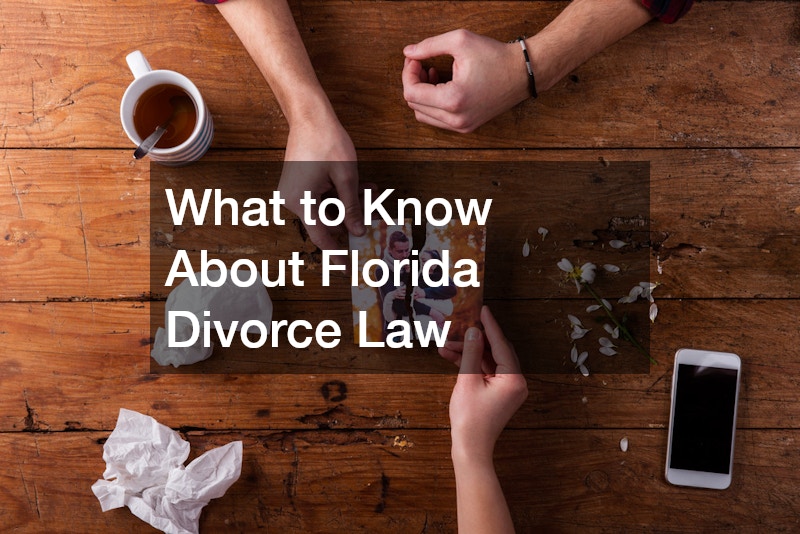
Divorce is a challenging process, both emotionally and legally, and navigating the legal aspects of it can feel overwhelming. If you’re considering filing for divorce in Florida, it’s essential to understand how Florida divorce law works. Florida’s divorce laws have specific provisions that differ from those in other states, so being informed can help you make sound decisions and reduce some of the stress involved in the process.
In this blog, we’ll cover the essential aspects of Florida divorce law, including the grounds for divorce, property division, child custody, alimony, and other key factors.
1. No-Fault Divorce State
One of the most important things to know about Florida divorce law is that Florida is a no-fault divorce state. This means that neither spouse is required to prove that the other is responsible for the breakdown of the marriage. Instead, a spouse must simply demonstrate that the marriage is “irretrievably broken” to file for divorce. Essentially, this means that if one spouse wants a divorce, the court will grant it, regardless of who is at fault for the separation.
The no-fault system simplifies the divorce process by removing the need to present evidence of wrongdoing, such as adultery or abuse. However, certain misconduct by one spouse, like domestic violence or financial fraud, may still influence issues like child custody or property division, but the actual divorce will not be denied based on these factors.
2. Residency Requirements
To file for divorce under Florida divorce law, at least one of the spouses must have been a resident of the state for at least six months before filing. This residency requirement ensures that Florida courts have jurisdiction over the divorce case. It’s important to note that even if both spouses no longer live in Florida, one spouse must meet this residency requirement to proceed with a divorce in the state.
Proof of residency can be established through a valid Florida driver’s license, state identification card, or voter registration. Fulfilling this requirement is one of the first steps in initiating the divorce process in Florida.
3. Property Division: Equitable Distribution
Florida divorce law follows the principle of equitable distribution when it comes to dividing marital assets and liabilities. This means that marital property is divided fairly but not necessarily equally between the spouses. The court considers several factors to determine how to divide the property, such as the length of the marriage, the financial situation of each spouse, contributions to the marriage (including non-financial contributions like homemaking), and any other relevant factors.
It’s important to distinguish between marital property and non-marital property. Marital property includes assets and debts acquired during the marriage, while non-marital property refers to assets owned by either spouse before the marriage or acquired through inheritance or gift. Non-marital property generally remains with the spouse who owns it, unless it has been commingled with marital property. Having a clear understanding of the division of assets is crucial during the divorce process.
4. Child Custody and Support
Child custody, now referred to as “parental responsibility” under Florida divorce law, is one of the most important aspects of divorce when children are involved. Florida courts prioritize the best interests of the child when determining parental responsibility and timesharing (physical custody). The court encourages both parents to be actively involved in the child’s life unless there is evidence that this would be detrimental to the child.
There are two types of parental responsibility: shared and sole. In most cases, Florida courts favor shared parental responsibility, where both parents make decisions regarding the child’s welfare, education, and medical care. However, in situations where one parent is deemed unfit or poses a risk to the child, the court may award sole parental responsibility to one parent.
In addition to custody, Florida divorce law requires both parents to provide financial support for their children. Child support is calculated using a standard formula that takes into account each parent’s income, the number of children, and the amount of time each parent spends with the children.
5. Alimony
Alimony, or spousal support, is another key issue in many Florida divorces. Florida divorce law allows for different types of alimony, including temporary, bridge-the-gap, rehabilitative, durational, and permanent alimony. The type and amount of alimony depend on factors such as the length of the marriage, the financial needs of the recipient spouse, and the ability of the paying spouse to provide support.
Short-term marriages (less than seven years) are less likely to result in permanent alimony, while long-term marriages (17 years or more) may qualify for more extended spousal support. The court will also consider each spouse’s financial situation, earning potential, and contributions to the marriage when determining alimony.
6. Simplified Dissolution of Marriage
In some cases, couples may qualify for a simplified dissolution of marriage, which is a quicker and less costly form of divorce under Florida divorce law. To qualify, both spouses must agree on all aspects of the divorce, including property division and child custody, and both must attend the final hearing. This option is only available to couples who do not have minor children and where neither spouse is seeking alimony.
.

